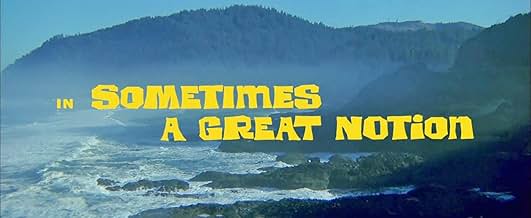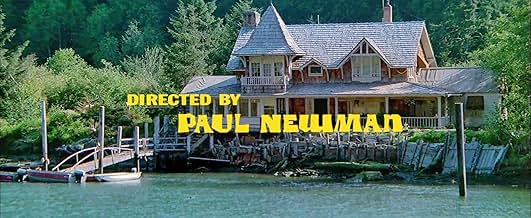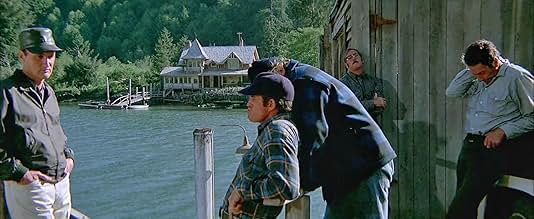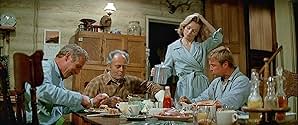AVALIAÇÃO DA IMDb
6,9/10
4,8 mil
SUA AVALIAÇÃO
Uma família de madeireiros independentes do Oregon luta para manter seu negócio familiar vivo em tempos de mudança.Uma família de madeireiros independentes do Oregon luta para manter seu negócio familiar vivo em tempos de mudança.Uma família de madeireiros independentes do Oregon luta para manter seu negócio familiar vivo em tempos de mudança.
- Direção
- Roteiristas
- Artistas
- Indicado a 2 Oscars
- 2 indicações no total
- Direção
- Roteiristas
- Elenco e equipe completos
- Produção, bilheteria e muito mais no IMDbPro
Avaliações em destaque
I saw this seventies movie for the first time last night. It must be one of the greats. The story line from Kesey's book, and the direction by Paul Newman are so closely woven and with such impact that there are times when one is left emotionally bare. There's not a fault in the casting,and the background of logging is nicely interwoven into the action bringing up surprise after surprise. The only flaw might be the glamorization of Lee Remick - I doubt that her character would show such a degree of grooming and cosmetic sophistication, but, as ever, Ms. Remick gives a performance that is impeccable. If awards were ever to come PaulNewman's way for direction and/or acting surely they should for this masterpiece.
The date i don't remember, but the day I do. what i did that day i should say. and the movie is still vividly in my mind. I can see the family interplay pretty clearly, but there is 1 scene clearer then all the others.
And more worried about creating a spoiler,
i will only describe it in general terms.
And that is the Death Scene in the picture, I don't want to mention the players in the scene for fear of spoiling it for others. it isn't a short scene, it felt like an eternity, for me anyway.
It is heart wrenching, and has haunted me all these years.
I would like to see this picture again to feel that emotion again.even now just talking around it i feel emotions welling up in me.
worthwhile movie I would recommend it for anyone.
And more worried about creating a spoiler,
i will only describe it in general terms.
And that is the Death Scene in the picture, I don't want to mention the players in the scene for fear of spoiling it for others. it isn't a short scene, it felt like an eternity, for me anyway.
It is heart wrenching, and has haunted me all these years.
I would like to see this picture again to feel that emotion again.even now just talking around it i feel emotions welling up in me.
worthwhile movie I would recommend it for anyone.
Kesey's superb epic novel with its shifting points of view and verb tense is far too complex a work to adapt directly. Kesey's prose while exceptionally cinematic in its description and action ironically proves unfilmable.
That said, Paul Newman and his production team have created a most admirable and solid, if rather top heavy adaption of Kesey's excellent novel.
The dialogue while rather shallow and weak in spurts (Kesey's rich vernacular is lost)is overcome by a wonderful ensemble cast featuring some of America's finest. Who better that Henry Fonda to play Newman's father? Richard Jaekel richly earns the Oscar nomination as the dim-witted but enthusiastic born again lumberjack Joe-Ben. The famous scene where Newman tries desperately to save Jaekel's character from drowning is heartbreakingly tragic and darkly comic. It is a marvelous example of direction.
Newman spent a great deal of time in my native Oregon researching the part and the film and his homework shows. Kesey's rich descriptions of the land remain largely intact. The sense of time and place is impressively captured in the photography of rusting metal, dripping ferns, rotting wood and mildewed carpets. This is a film that one can almost smell.
Newman is one of the finest artists ever to come out of Hollywood. Not only as an actor, but also as a director. He instinctivly knows how to illicit naturalistic, comfortable and utterly human performances from his casts and Sometimes a Great Notion is no exception. Well worth a look. 7 out of 10 stars.
That said, Paul Newman and his production team have created a most admirable and solid, if rather top heavy adaption of Kesey's excellent novel.
The dialogue while rather shallow and weak in spurts (Kesey's rich vernacular is lost)is overcome by a wonderful ensemble cast featuring some of America's finest. Who better that Henry Fonda to play Newman's father? Richard Jaekel richly earns the Oscar nomination as the dim-witted but enthusiastic born again lumberjack Joe-Ben. The famous scene where Newman tries desperately to save Jaekel's character from drowning is heartbreakingly tragic and darkly comic. It is a marvelous example of direction.
Newman spent a great deal of time in my native Oregon researching the part and the film and his homework shows. Kesey's rich descriptions of the land remain largely intact. The sense of time and place is impressively captured in the photography of rusting metal, dripping ferns, rotting wood and mildewed carpets. This is a film that one can almost smell.
Newman is one of the finest artists ever to come out of Hollywood. Not only as an actor, but also as a director. He instinctivly knows how to illicit naturalistic, comfortable and utterly human performances from his casts and Sometimes a Great Notion is no exception. Well worth a look. 7 out of 10 stars.
Unfortunately, as much as I love Paul Newman as an actor, the movie version of Ken Kesey's incredible book could have used a more seasoned director for its translation to the big screen. The perfect cast (the book even mentions Hank Stamper as looking like a muscular Paul Newman!), and some great performances (Fonda, Jaeckel, Remick), but the story just doesn't come across on film the way it should. I remember the first time I saw this movie was in the late 70's on TV (Portland's KPTV-12). It was so chopped-up for television that the story, character motivations, and ending made no sense at all to me. I loved Kesey's book "Cookoo's Nest" so read the novel of "Sometimes" to try to make some sense of what the story was all about. The book was an amazingly nuanced work of fiction with a great deal of depth and under-story (reading between the lines); none of which I saw on the TV screening. I later rented the video but even with the unedited version of the film, I found the story very lacking and barely comprehensive. I've recently watched the rental again (2005) and found more in the film than I had remembered, but I still feel that unless you've read the book, you can't truly understand what this movie and the character motivations are all about. They're just barely eluded to in the film version. In spite of all that, it's still a worthwhile movie to watch. If nothing else, it chronicles some great, authentic-looking logging footage. If you can, however, read the novel first and then catch the film. Also, if you ever make it to Newport, Oregon, visit the harbor bar "Bay Haven" where the scenes for the "Snag" were filmed. Tell them the old bartender from the "Embarcadero" sent you. ;-)
Sometimes a Great Notion (1970)
This is an amazing story, with some harrowing scenes and really terrific acting. And it's based on a Ken Kesey novel that is one of my favorite books, a sprawling, difficult, layered up masterpiece of some kind, for its time at least, and for when I read it as a 20 year old looking for meaning in life. There are so many threads in the book, powerful themes and small ones, that get interwoven into a vivid, unashamed adventure-romance with interior explosions and characters clashing with nature and cultures clashing of cultures, it's really impossible to make a movie out of it.
But Paul Newman, as lead character and, yes director (stepping in when the original director left), has tried. The result is grossly unappreciated, because the strengths here make the flaws bearable. The flaws are clear. The casting is uneven. Lee Remick is a character from another movie plopped into this rough and tumble Oregon backwoods scene, and the second leading man, a kind of implied narrator to it all, is played by little known Michael Serrazin, a pretty boy who holds his own but is uninspiring.
Furthermore, the filming is straight on and meant to show what is happening more than contribute to the ambiance of the experience. There are scenes of machinery and logging that are impressive in their raw scale and masculinity, for sure, but that is partly fast editing at work, and amazing subject material. The rainy coastal landscape, the rambling house on the river, even the dirt bike race and the scenes of the little town all make you yearn for more intensity and involvement, visually.
The music by Henry Mancini shows the strain of this amazing composer as he moves from the light orchestral work he did in the 1960s ("Moon River," "Pink Panther," "Days of Wine and Roses," etc.) to something embracing country, rock and roll, and contemporary music being used so effectively in New Hollywood films. It's halfway there, but gives a falseness to some of the scenes that gets in the way of the gritty, emotional drama to it all.
And I mean emotional. Some have criticized Kesey's novel for overachieving. It tries to deal with every big issue there is in one book: individualism and love, above all, but a highly dysfunctional family, the new America of college and drugs vs. the old one of hard work and croneyism, raw beauty in the landscape vs. exploiting nature for commercial gain, and loyalty to family in all its layers of father and sons, sons and lovers, and workers as part of extended family. But that's what makes the book and the movie terrific. The scenes here of Newman doing anything, of Henry Fonda playing the tough as nails dad, and of some of the side actors in their rough daily working roles in the woods are right on. The hospital scene with Newman and Fonda is a small gem, and the famous scene of Newman trying to free his little brother (played by Richard Jaeckel) caught under a log under water is utterly unforgettable. Utterly.
There is a lot of filler her, lots of falling trees and bikers racing and a building of the toughness of this manly world. But hang in there for the other stuff. And read the book.
This is an amazing story, with some harrowing scenes and really terrific acting. And it's based on a Ken Kesey novel that is one of my favorite books, a sprawling, difficult, layered up masterpiece of some kind, for its time at least, and for when I read it as a 20 year old looking for meaning in life. There are so many threads in the book, powerful themes and small ones, that get interwoven into a vivid, unashamed adventure-romance with interior explosions and characters clashing with nature and cultures clashing of cultures, it's really impossible to make a movie out of it.
But Paul Newman, as lead character and, yes director (stepping in when the original director left), has tried. The result is grossly unappreciated, because the strengths here make the flaws bearable. The flaws are clear. The casting is uneven. Lee Remick is a character from another movie plopped into this rough and tumble Oregon backwoods scene, and the second leading man, a kind of implied narrator to it all, is played by little known Michael Serrazin, a pretty boy who holds his own but is uninspiring.
Furthermore, the filming is straight on and meant to show what is happening more than contribute to the ambiance of the experience. There are scenes of machinery and logging that are impressive in their raw scale and masculinity, for sure, but that is partly fast editing at work, and amazing subject material. The rainy coastal landscape, the rambling house on the river, even the dirt bike race and the scenes of the little town all make you yearn for more intensity and involvement, visually.
The music by Henry Mancini shows the strain of this amazing composer as he moves from the light orchestral work he did in the 1960s ("Moon River," "Pink Panther," "Days of Wine and Roses," etc.) to something embracing country, rock and roll, and contemporary music being used so effectively in New Hollywood films. It's halfway there, but gives a falseness to some of the scenes that gets in the way of the gritty, emotional drama to it all.
And I mean emotional. Some have criticized Kesey's novel for overachieving. It tries to deal with every big issue there is in one book: individualism and love, above all, but a highly dysfunctional family, the new America of college and drugs vs. the old one of hard work and croneyism, raw beauty in the landscape vs. exploiting nature for commercial gain, and loyalty to family in all its layers of father and sons, sons and lovers, and workers as part of extended family. But that's what makes the book and the movie terrific. The scenes here of Newman doing anything, of Henry Fonda playing the tough as nails dad, and of some of the side actors in their rough daily working roles in the woods are right on. The hospital scene with Newman and Fonda is a small gem, and the famous scene of Newman trying to free his little brother (played by Richard Jaeckel) caught under a log under water is utterly unforgettable. Utterly.
There is a lot of filler her, lots of falling trees and bikers racing and a building of the toughness of this manly world. But hang in there for the other stuff. And read the book.
Você sabia?
- CuriosidadesThis was the first film ever shown on HBO when the service premiered in 1972.
- Erros de gravaçãoIn the fox-hunt scene, when the fox jumps over the fence, it becomes apparent that the fox is wearing a 1/4" black collar with a little tiny bell on it.
- Citações
Hank Stamper: [singing] Don't ever hit your mother with a shovel. It will leave a dull impression on her mind. Paul Newman said the same line in "Butch Cassidy and the Sundance Kid".
- Versões alternativasIn the earliest video release version, circa 1982, when Leland first arrives, a crane shot reveals Hank looking down below at the family reunion. In the most current VHS release, circa 1994, the crane shot is edited out and replaced with just a single cut from Viv, with an audio bridge to Hank on the roof.
- ConexõesFeatured in AFI Life Achievement Award: A Tribute to Henry Fonda (1978)
- Trilhas sonorasAll His Children
Lyrics by Marilyn Bergman and Alan Bergman
Music by Henry Mancini
Sung by Charley Pride
Principais escolhas
Faça login para avaliar e ver a lista de recomendações personalizadas
- How long is Sometimes a Great Notion?Fornecido pela Alexa
Detalhes
- Data de lançamento
- País de origem
- Idioma
- Também conhecido como
- Sometimes a Great Notion
- Locações de filme
- Empresas de produção
- Consulte mais créditos da empresa na IMDbPro
Bilheteria
- Orçamento
- US$ 3.660.000 (estimativa)
- Tempo de duração1 hora 54 minutos
- Proporção
- 2.35 : 1
Contribua para esta página
Sugerir uma alteração ou adicionar conteúdo ausente





















